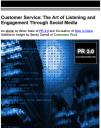Is Retail Customer-Focused?
Posted by Becky Carroll on July 24, 2008
 I heard a very interesting observation from a 14 year old young man the other day.
I heard a very interesting observation from a 14 year old young man the other day.
“Why don’t they sell swim trunks in July? That’s when I need them. Seems like stores aren’t very focused on what their customers need!”
Now, I know all you folks out there in retail-land have your reasons for why this occurs. Seasons for the industry are not the same as the seasons for consumers. Inventory needs to be cleared out for next season’s merchandise. I am sure you can share more.
However, let’s look at this from a customer’s perspective. It took driving to 6 stores and over 50 miles (total) to find a pair of swim trunks that fit. This is due to the fact that most swim trunks are no longer in stock. If we had wanted to find a winter outfit, or something for back-to-school, we would have been set!
Putting Customers First
There needs to be some type of balance between the needs of the business and the needs of the customer. Sure, it is difficult when a whole industry is set up to operate on a certain schedule. However, our next generation is looking for a new, practical approach to business. They want to feel important, like they matter to companies. This will be key in building relationships with them.
We can build all the cool social media sites we want, connect with our customers on Facebook and MySpace, and even get them to spread our message virally. But if they come into our shops and retail spaces and we don’t have what they need, that creates shaky ground for any relationship already built.
Organizations need to stay in tune with what their customers need, want, and desire. One of the best ways to do this is with ongoing customer conversation. Keep in touch, remind them you are there, and meet their needs. These steps will help strengthen any shaky foundations that may have developed due to thinking more about ourselves than our customers.
This entry was posted on July 24, 2008 at 10:16 am and is filed under Customer experience, Customer loyalty, Marketing. Tagged: customer focus, retail, social media. You can follow any responses to this entry through the RSS 2.0 feed. You can leave a response, or trackback from your own site.








John Maver said
This is a great post!!!! It is so perfect for what is happening in the stores. My son who is mid thirties went into 6 stores looking for a spring jacket for his two daughters IN SPRING!!! And they didn’t have them any more. Right, they had summer merchandise.
I am seeing the beginning of Halloween candy appearing now and it is still July. Back to school has almost come and gone.
No wonder so many stores are having trouble surviving.
There doesn’t seem to be any common sense here.
Perhaps my company the Maver Management Group will start a chain of stores called SEASONAL MERCHANDISE IN THE SEASON.
Would you shop there?
Thanks for the article.
John
Pam Brown said
Becky,
You couldn’t have said it better. I’ve worked as a graphic designer for retail giants before and it disturbed me that we were always working on sale catalogs, signage and such, 6-8 months prior to the season! I know it takes time for publications to print and so on, but it seemed like the buyers were pushing us into 2 seasons ahead.
What I want to know is who established this schedule of seasons for consumers? And why is it across the board and not related to the climates we live in? Like Southern California won’t be needing sweaters or jackets until December and they are already in our stores. I cringed when I saw Autumn/Halloween decorations in Rite Aid yesterday.
Why can’t we just live in the moment?
Thanks for this post. I hope it brings more awareness to the people deciding what goes in our stores and when.
Pam
Dan Ness said
Great post, Becky!
You’ve once again put your finger on the core problem – most retail industry employees are shielded from the customer. Sure, retail researchers and marketers themselves are extremely savvy. We work with them all the time and their knowledge is deep & nuanced, with all the nearly-intimate customer information increasingly available.
It’s too often that the critical customer information seems to stop at the researcher’s door. The rest of their retail organization is largely out of touch with the ultimate customer. Many retailer’s other employees consider segmention and target marketing as a cost item. They dwell on the limits of customer-specific products and placement.
Meanwhile, look at Amazon’s latest quarter and see how they have leveraged their direct customer connection to deeply understand their customers.
At the other end of the spectrum, there’s that legend running around that WalMart is so sophisticated in its product placement and timing that it stocks up certain stores on cherry pop-tarts just days before floods and hurricanes. They anticipate what their buyers want – and when – even down to the safety food hoarded by the pre-disaster crowd.
Glenn said
Amen, Becky. I found the last pair of water shoes at my big box sporting goods store. I feel sorry for the next person to come looking for them. And it’s not even August yet.
Kathleen said
And stores wonder why online ordering has become SO popular. I just love those boxes to show up with WHAT I NEED.
BJ Cook said
Hey Becky,
It’s amazing to see all of these people in one place basically saying:
1. Companies aren’t listening.
2. Customer-centric initiatives are second to bottom line driven strategies.
3. Employees aren’t empowered to help customers.
4. Technology is lacking in the space of customer relationship or the feedback collected isn’t being used.
5. All of the Above
Hopefully, we’ll make a little wave out of San Diego to help some of these companies out 😉
Lewis Green said
Great post Becky. Your point is similar to Market Research and Advertising execs love affair with the 18 – 34 year-old age groups. The theory is creating life-long customers, which almost never happens any more. And one of the reasons for that is, as you say, businesses care more about their theories than their customers. Put people ahead of short-term cost analysis and loyal customers will be the result.
web page said
To keep your worries at bay Weight gain products are available to gain mass or gain weight.
Bitter orange extract chemicals may increase heart rate, blood pressure, migraines and cause fainting, strokes and heart attacks.
and the only side effects were these health benefits.